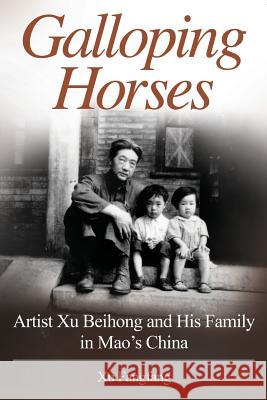Galloping Horses: Artist Xu Beihong and His Family in Mao's China » książka
Galloping Horses: Artist Xu Beihong and His Family in Mao's China
ISBN-13: 9780997057416 / Angielski / Miękka / 2016 / 318 str.
Famous for his ink brush paintings of galloping horses, pioneering Chinese artist Xu Beihong (1895-1953) integrated Chinese and Western painting and mentored generations of Chinese artists. Galloping Horses describes how his family and legacy survived the turbulence of Mao's ever-changing policies, which dictated the direction of art and music from 1949 through the devastating ten-year Cultural Revolution. Xu Beihong's daughter narrates this story of the Xu family, its tragedies, and the perseverance of Xu's widow Liao Jingwen, keeper of her husband's legacy for sixty years after his death. The author, a pianist and arts administrator, together with Xu Beihong's son, an artist and art teacher, and their mother, with commitment and struggle, carried forward Xu's legacy and accomplished his unfulfilled missions. The author describes her life and education as a music student in Mao Zedong's China and her work as a professional musician in Jiang Qing's model Peking opera.
Famous for his ink brush paintings of galloping horses, pioneering Chinese artist Xu Beihong (1895-1953) integrated Chinese and Western painting and mentored generations of Chinese artists. Galloping Horses describes how his family and legacy survived the turbulence of Mao’s ever-changing policies, which dictated the direction of art and music from 1949 through the devastating ten-year Cultural Revolution.Xu Beihong’s daughter narrates this story of the Xu family, its tragedies, and the perseverance of Xu’s widow Liao Jingwen, keeper of her husband’s legacy for sixty years after his death. The author, a pianist and arts administrator, together with Xu Beihong’s son, an artist and art teacher, and their mother, with commitment and struggle, carried forward Xu’s legacy and accomplished his unfulfilled missions. The author describes her life and education as a music student in Mao Zedong’s China and her work as a professional musician in Jiang Qing’s model Peking opera.











